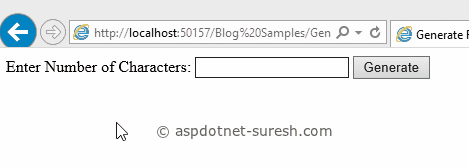

This type has almost all of the functions available in the math/rand package, but we are able to isolate it so that no other code can affect our seed. The first few lines should look familiar to anyone who has written some Go code before - we start by declaring our package, and then follow it with a few imports stating the packages we will be using in our code.Īfter that we declare a global variable named seededRand with the type *rand.Rand.

Package rand import ( "math/rand" "time" ) var seededRand * rand. In it we are going to start by writing an init() function that handles seeding the math/rand package. Open rand/strings.go if you haven’t already. As of now that is the entirety of our package, but you might find yourself updating this package over time so it is good to start with that in mind.

In the rand/strings.go file we are going to store all of our functions related to random strings. For now we will only have functions related to strings, but you are welcome to add to the package over time as your project needs evolve. The rand directory is going to store all of our code that is part of the rand package we are creating. Once you do that, create a file named strings.go in the newly created directory. This is going to change based on your local environment, but I suggest creating a folder named rand inside of whatever directory you are working in. The first thing we are going to is create a directory to store our new package. Side Note: I have written about generating random string in the past as part of a list of tips for using strings in Go, but I felt that the topic deserves its own post as it is a pretty common request on its own. If you do happen to find yourself still using the math/rand package in other parts of your application, it might be worth considering either moving some of that code into a function in your new rand package so that it is easier to reuse and test in isolation. It might seem odd to wrap another package with the same package name, but in my experience (and in others’ experience) this pattern works well when you want to wrap a package based on the context of what you are building, or if you want to isolate some details that just aren’t relevant to the rest of your application. That way the rest of our code doesn’t need to concern itself with the implementation details of generating random strings, but can instead simply call functions like rand.String(10) to get a random string with 10 characters in it. What this means is we are going to create a custom package named rand that will utilize the functionality provided by the math/rand package in order to create our own functions, and mask most of the implementation details. String() - this function will only take in a length, and will use a default characters set to generate a random string.

StringWithCharset() - this function will take in a character set and a length and will generate a random string using that character set.To do this, we will write a short rand package that wraps the math/rand package and provides the following two functions:
#GENERATE RANDOM STRING ONLINE HOW TO#
The first thing you will want to do is create a helper function that can grab a random value from an array.In this post are we going to cover how to create a function that will allow us to generate random strings of any length in our Go code.


 0 kommentar(er)
0 kommentar(er)
